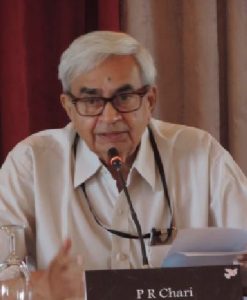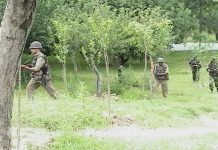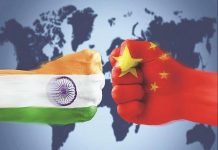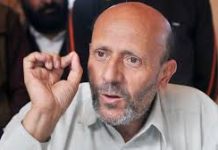Edited Excerpts from an interview •

Director of the Institute of Peace and Conflict Studies
How do you see the upcoming visit of US Secretary of State Colin Powell?
India must fight its own battle against Kashmir, and must do so independently. The Indian government needs to have in place a policy on Kashmir, and on tackling terrorism. India must deal with her own people. If one thinks about it, even if the component of foreign mercenaries is as high as 60 per cent, that still means that 40 per cent of the militants are indigenous.
What is the government doing to tackle them?
The Vajpayee government is trying to externalise the problem, hoping that US President George W Bush will pull chestnuts from the fire for India. That is where India becomes susceptible to foreign pressures. The US is bound to seize the opportunity to nudge both India and Pakistan towards a dialogue.
Do you think there is a change in the Indian policy on the issue?
Well, the government has lately begun to demonstrate a tendency to externalise its problems. In the absence of a Kashmir policy, the Vajpayee government is falling into the Pakistani mindset of externalising its problems. Pakistan has been doing that all along, by raising the Kashmir issue in international fora and pleading for third party mediation. Now, the Vajpayee government seems to be following suit.
How do you view Prime Minister Vajpayee’s letter to Bush on the suicide attack on the Jammu and Kashmir Assembly complex on October 1?
Of late, the tendency to externalise the problem seems to be much in evidence. Vajpayee’s letter to Bush was the first sign of this. India has the status of being a regional power, and a leader of the Third World. All along, India has stood firm on settling all issues in a bilateral format, and had always opposed third-party mediation. It is against this backdrop that the latest developments have come as a surprise. This is not a happy development. India must draw up its own initiatives, and forge ahead on the issue of tackling terrorism in Kashmir. This can be done only when you have a credible Kashmir policy in place.
What, according to you, is the way out for India?
Evolving a well-defined Kashmir policy is the first step. The government seems to be floundering, in the absence of a Kashmir policy. There have been confusing signals from the government. The tendency is to plan intensifying military operations to stamp out militancy. That is not a happy approach. There has to be a political solution to the issue. There can be no military solution to the Kashmir issue. The issue of alienation needs to be addressed urgently. The government cannot turn a Nelson’s eye to the issue of autonomy.
Do you think the Burkina Faso Declaration of 1995 could provide a durable basis for seeking a lasting solution?
The basic approach has been sound. Since many years have elapsed, it may need to be updated. There has to be a package solution, with strong autonomy and economic components to it. The Jammu and Kashmir Assembly had adopted a resolution on state autonomy, which the Centre summarily rejected. Instead, the government would have done well to consider it first, and then take a decision on it. It might have been possible for the government to accept some elements of the resolution. Some elements could have been rejected. Summary rejection sends out wrong signals to people in the Valley. By summary rejection of the autonomy proposal, the signal sent out is that the Centre is impervious to the aspirations of the Kashmiri people.
What, according to you, will be the impact of the current war on terrorist violence in India?
The jihadis are bound to realise very soon that the days of the Taliban regime are numbered. This could lead to a more fearsome prospect. A possible scenario could be that, the jihadis could turn to the Kashmir Valley, choosing to die there, rather than in Afghanistan. It may result in stepped-up terrorist violence in the Valley. The intensified US-led drive against Taliban may well force militants to flee the region and shift to the Kashmir Valley. That could be a terrible prospect.
How do you see the impact of the current war on the Muslim nations?
Muslims are sure to be in an introspective mood. The Muslim nations are passing through a difficult phase. The genre of hotheads may soon be replaced by the more rational. Most regimes in the Muslim world now seem to favour reining in the jihadis. The entire process may see emergence of the moderate face of the Muslims – far removed from the familiar face of an armed jihadi that now one gets to see.
letters@tehelka.com












